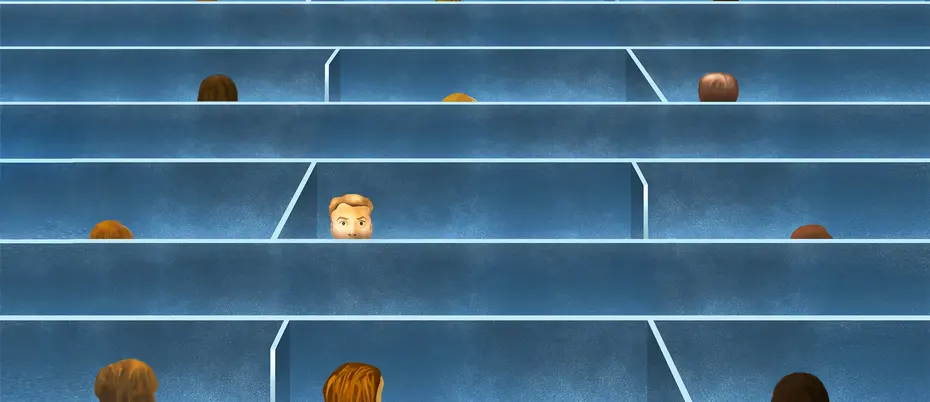Career
Find your 'job turf' for salary bargaining power
Workers who have job turf — space that only they work in — often see their income go up. All the better if they multitask by specializing in a variety of skills.
Nathan Wilmers studies income inequality. He wants to understand why it happens, and how it might be solved. In a recently published study, the MIT Sloan assistant professor examined income inequality within the workplace. And he found a few things that push some workers forward, while leaving others behind.
In the interview below, Wilmers, a member of the faculty steering committee for the Good Companies, Good Jobs Initiative at MIT Sloan, explains what multitasking and job turf mean for worker income.
The study, “Job Turf or Variety: Task Structure as a Source of Organizational Inequality” was published Feb. 25 in Administrative Science Quarterly.
Your new study has intriguing findings about a dynamic that affects income inequality on a micro level — within a particular workplace. Tell us a little bit about this research.
I started this project because sociologists who study organizations talk a lot about organizational structure and management practices without talking much about work itself and what tasks people do day to day at work. Insofar as we have studied tasks and inequality, it's mostly been about big-picture compositional changes in the kinds of work that people do over time, such as a decline in routine tasks and less manufacturing. I was interested in whether you can better understand wage inequality within organizations, among coworkers, by thinking about how tasks are allocated among them. Assuming that there's a set of tasks that a workplace needs to get done, does arranging those tasks differently across the workers that you're employing affect inequality?
Specifically I tested two things. One is the wage effect of having more or less multitasking. If you've got two tasks that need to get done — let's say computer programming and administrative work — and you employed two workers, you could have both of them doing both tasks. Or you could have one worker focusing on administrative work and the other doing programming. There has been some previous research showing that multitasking or job rotation tends to increase pay for workers because they're more versatile and have to have a larger number of skills. So that's the first thing I looked at.
But I also looked at whether you're the only person in your workplace doing what you do. I call it job turf when you're the sole person in your workplace doing a certain task. My prediction was that if you have job turf, that's going to increase your bargaining power vis-à-vis an employer, because you're the only person in the workplace who knows how to do that task.
What I found in my research is that as multitasking increases, wages tend to increase. And as job turf increases, pay also increases for workers. Interestingly, there's a relationship between these two aspects of task assignment: If your coworkers’ tasks get more specialized and singular, you tend to get more job turf.
Let me see if I’m understanding how that works: Suppose initially, you and a coworker are doing a variety of bookkeeping tasks that include payroll-related tasks. But the company grows, and suddenly your coworker is so busy doing just bookkeeping tasks related to payroll that you end up doing a broader range of bookkeeping tasks.
That’s right. And that tends to get you more job turf, because the person who's just doing payroll used to also do other things that now you're the only one doing. The interesting upshot of this is that it means that as multitasking is decreasing among some workers, which is going to lower their wages, job turf is increasing among other workers, which is going to raise their wages. So that's why you end up with this within-workplace inequality effect among coworkers.
This finding has career management implications for people at all levels in an organization. How could an employee apply this finding to his or her own work situation?
It suggests that, on the one hand, it makes sense to try to do lots of different things so that you're more versatile and building more skills. But on the other hand, you want to be doing things that other people in your workplace aren't already doing. You need to make yourself distinctive from your coworkers.
And I assume that if you develop skills in an area that over time becomes less valuable to your employer, that probably won’t increase your wages. So, as an employee, I imagine you want to figure out: Are there tasks that I can put myself forward for that are valuable to the organization but nobody else is doing?
That's right. If you can find some kind of niche distinctive thing to be doing, that job turf could increase your bargaining power.
It strikes me that there's another implication of this research — which is that you really don't want to specialize in a task that other people in your workplace also do. I'm guessing that if you find yourself stuck just doing one task that other people in the company also can do, you should seek to get either something more distinctive to do or a greater variety of tasks.
Yes, sure.
What's next in your research?
My main ongoing project involves trying to figure out how much of inequality is due to rising pay differences between occupations versus differences between workplaces. So far, we're finding that there's been an increase in workplaces that pay a lot and employ a lot of high-paying occupations and also an increase in workplaces that don't pay much and employ relatively lower-skilled occupations. But it’s too early to say much about that study.
This interview was adapted from the Good Jobs, Good Companies Initiative at MIT Sloan’s “Work in Progress” series.




